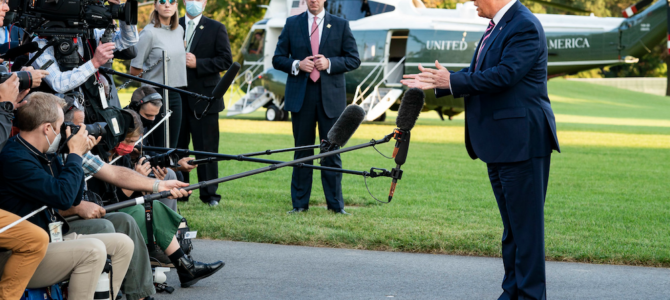
President Donald Trump is recovering from COVID-19, a.k.a. the China plague. Some of his opponents took the high road and wished him a swift recovery, while others took the low road, gloating over his illness, hoping for his suffering and death, and spinning conspiracy theories. A few managed to do both, with their supposed well-wishes revealing more than they meant to.
For example, New York Times columnist Bret Stephens wrote a preening article on why Trump’s opponents should wish the president well. Stephens is a conservative of the socially liberal sort that mostly conserves the profit margins of the Fortune 500. Although he is not popular with his paper’s readership (much of which affects to despise the grubby business of business, even as they browse a paper stuffed with advertisements from luxury brands), he shares their disdain for Trump.
Even his effort at wishing the president well was a mix of political calculation and moral self-congratulation that inadvertently illuminated Stephens’s blind spots. For instance, he argued that among the reasons he hoped for the president’s recovery is that our nation, and the world, needs a clear electoral, not medical, repudiation of Trump and right-wing populism.
He warned, however, that if Trump is reelected, “then those of us who are his opponents will have to take stock of the ways in which we have hurt our own cause. That includes the way in which our personal distaste for the man and our condescension, overt or implicit, to his voters have made us even more distasteful to ordinary Americans than he is.”
Elites Take No Responsibility for the Results of 2016
This candid admission that our elites will bother with introspection only in the event of further political defeat is telling. So long as Biden wins, Stephens and his ilk can write off the 2016 election as a fluke and carry on untroubled by the 40-something percent of voters who still find them more repugnant than Trump. In this view, right-wing populism is a bizarre Trump-dependent aberration, rather than an inevitable response to establishment failures on both the right and left.
This is a remarkably irresponsible position for our elites to take — absolving themselves of responsibility for past failures even as they insist on being given more power. Not only is it arrogant, but it is also politically foolish because it will make it easy for someone with more discipline and less baggage than Trump to pick up the populist issues and themes he was elected on. The way to defuse and moderate the danger of populist excess is to address the legitimate concerns and failures that fuel populism, not to ignore them.
The catalog of establishment failures is well-worn at this point, although perhaps less than it should be in the pages of The New York Times. The Republican Party was out of ideas and declining into “zombie Reaganism” while running on endless tax cuts and maintaining military occupation in the Middle East. The Democratic Party was a mix of the Clinton machine and would-be socialists, and each faction was often more concerned with pronouns and bathrooms than working families. The establishments of both parties had embraced the rise of China while insisting that free trade must extend to totalitarian slave states.
Worse than the policy mistakes were the cultural and moral failures. Stephens sees an enormous divide between himself and the president, but many Americans look from our elites to Trump, and from Trump to our elites, and don’t see any fundamental difference. Thus when Stephens concludes his column with a long list of reasons why “we are better than he is,” this is just the sort of moral preening that is “distasteful to ordinary Americans.”
The Elites Are No Better Than Trump
Stephens’s list of Trump’s sins is curated to show Trump as vicious and vulgar, and to avoid the considerable overlap between his sins and those of our elite. Some of Trump’s critics complain that his defenders reduce the president’s flaws to mere bad manners, rather than addressing his more substantial sins.
Many critics, however, focus on the president’s bad manners because that is the area in which they can most easily condemn him without also condemning themselves. After all, if they were to attack him for adultery, envy, malice, gossip, slander, and many other sins, they would often have to examine their own souls as well.
It might be argued that Trump is still worse, that he’s a fan of all seven deadly sins. Perhaps, but that sort of argument would be more persuasive from an elite that had not spent decades conspicuously indulging itself and mocking virtue as boring and repressive. The years since Trump’s election have only emphasized the rot of our elites, from Hollywood to the many friends of Jeffrey Epstein.
Trump was physically ill, but culturally he is only the symptom, not the disease. Our elites should have responded to his election with repentance, but instead, they preen over how much better they are than that crude sinner in the White House and the voters who put him there.
The president is physically recovering, but the spiritual sores of our culture will continue to fester until there is repentance, to which we are all called. Contrite hearts do not boast of their superiority to other sinners.









